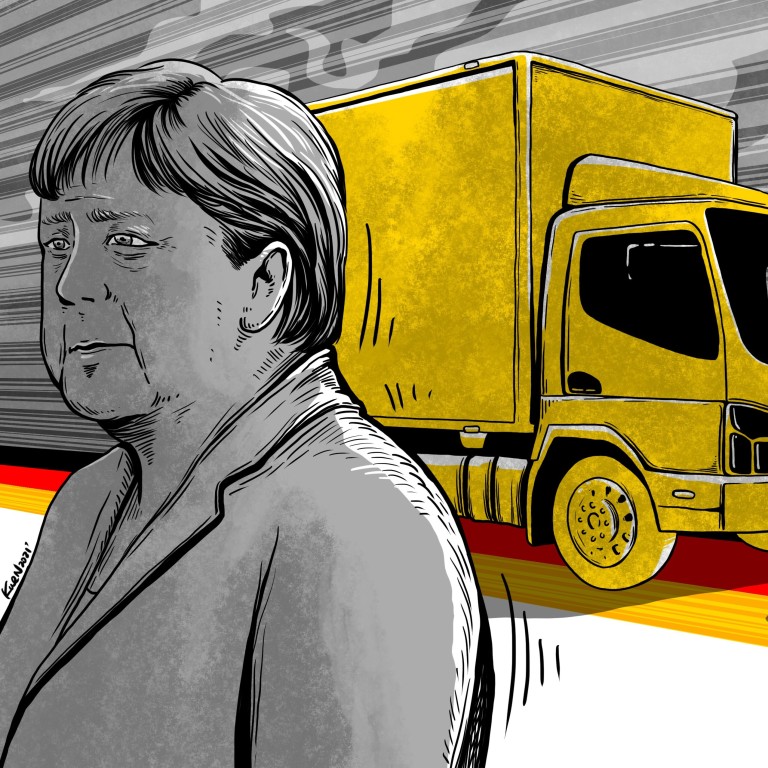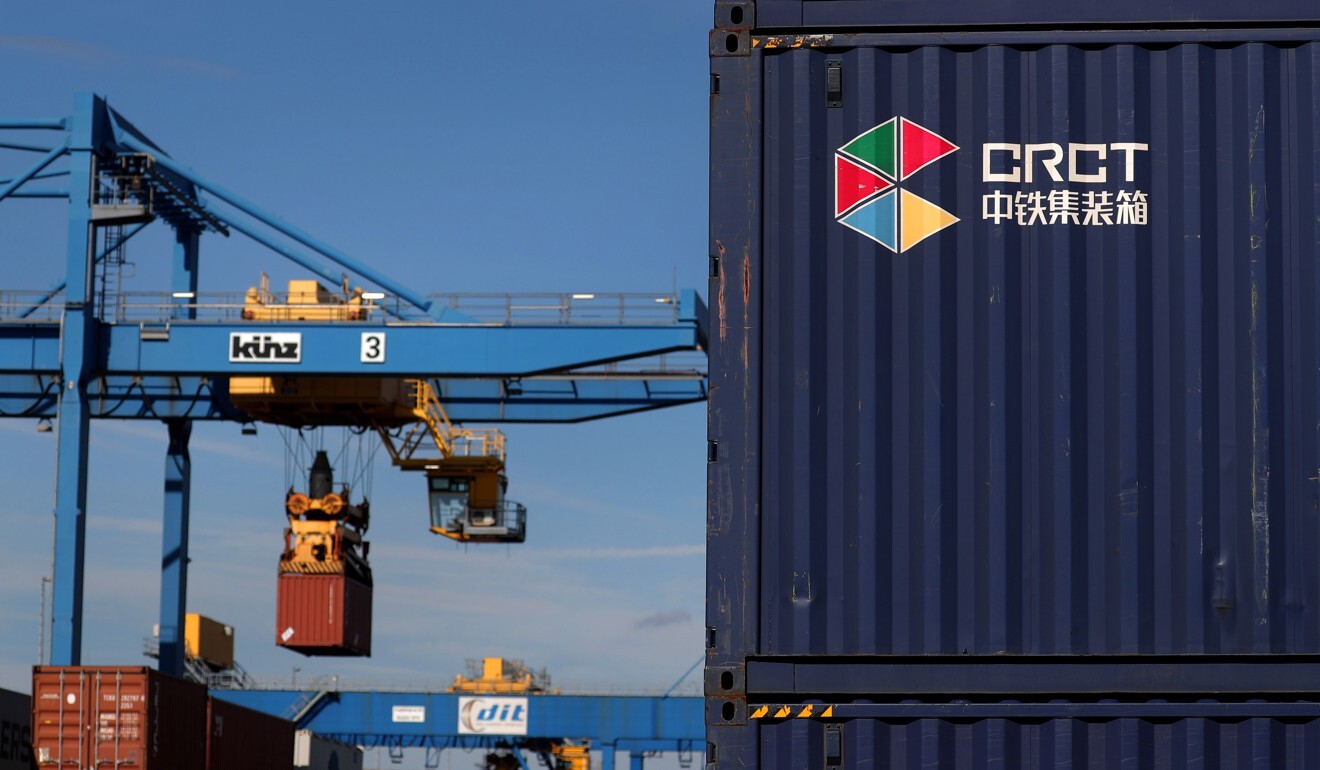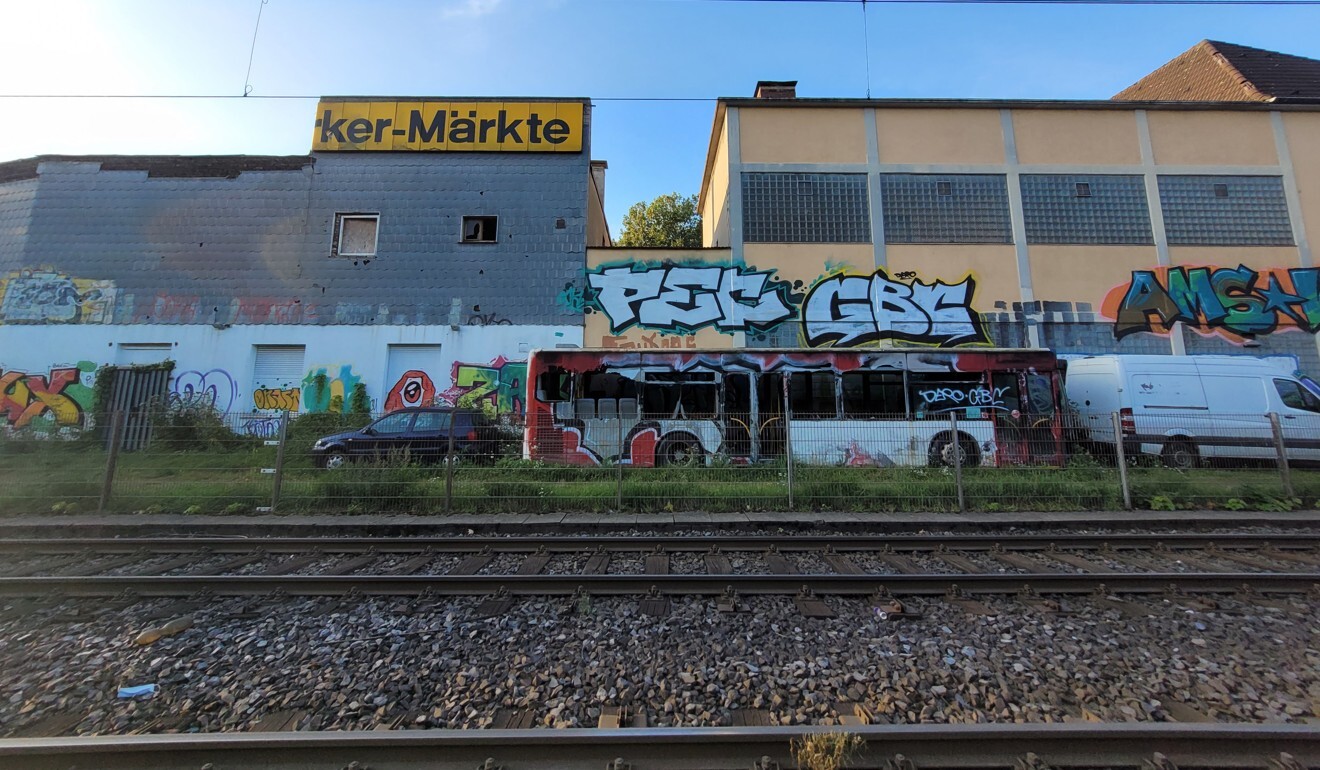
As Angela Merkel’s exit approaches, Germany’s ‘China city’ nervously eyes the future
- Germany’s ‘China city’ Duisburg has long hoped that the surging export-import business would turn into larger investments and jobs
- But German election day is September 26, the end of the Angela Merkel era and what many predict will be a turning point for German-Chinese relations
A German truck pulls out of a logistics park on the banks of the Rhine, carrying an azure blue container emblazoned with the logo of the Xian port on its chassis.
It drives past the rusted railway tracks on which the box arrived from China, part of a growing convoy of up to 80 trains a week that arrive in Duisburg from China then fan out into continental Europe. One container down, thousands to go.
There are stacks of Chinese containers everywhere in this busy inland port, bearing the names Zhejiang International Hub, China Shipping or YuXinOu Logistics of Chongqing.
Business is booming as the number of trains arriving has more than doubled over the course of the pandemic. Each train carries 41 containers loaded with desks, yoga mats, or pet food, goods pumped out in Chinese factories, to be spirited via Autobahn or the rivers Ruhr and Rhine.

This is, local officials say, “Germany’s China city”. They have long hoped that the surging export-import business would turn into something greater than a thoroughfare for Chinese containers – larger investments bringing jobs to this rundown town at the heart of Germany’s rust belt.
“Ideas and innovation, they don’t come in containers,” said Rasmus Beck, CEO of local investment promotion authority Duisburg Business and Innovation (DBI), who wants to see the docklands investment seep into the rest of the city.
In 2014, Xi Jinping stood at the Duisport, on the site of an old steelworks covering the size of 371 football fields that had been earlier offshored to China, pronouncing it the end point of his ambitious Belt and Road Initiative.
China’s appearance on the scene was supposed to be an antidote to the economic malaise.
Germany’s ambassador to China dies suddenly days after taking office
For 16 years, ties have been driven by commercial interests, but pressure has been gradually mounting from the business community and international partners to address China’s alleged commercial foul play, economic coercion, security threat and human rights issues more seriously.
The very visceral pushback against China in the American Rust Belt that helped power Donald Trump to the presidency in 2016 does not exist in the German equivalent, the Ruhr valley. Generally, the country’s export-led economy has done well out of China’s rise.

“In Germany, that blame is much less on China, because the gains are bigger from globalisation than the loss of the economy as a whole,” said Cora Jungbluth, an economic expert at German think tank Bertelsmann Stiftung, adding that the social safety net in Germany also helped shelter it from the ravages of global industrial shifts.
But senior officials from each of the major political parties told the Post that whatever the results of the most open election for decades, there can be no maintaining the status quo on China.
“Any new chancellor, any new coalition will have to change course on China because China has changed as well,” said Nils Schmid, the foreign affairs spokesman for the front-running Social Democratic Party (SPD).
His message to German regions becoming reliant on China for investment or exports is simple: “This is ill-fated”.
“It will definitely not be the status quo.”
Duisburg may be swimming against the tide by actively courting Chinese investment to plug a 12 per cent gap in employment that is more than twice the national level.
Germany’s China challenge: it’s important, but voters don’t care
Johannes Pflug, 75, served four terms in the Bundestag – Germany’s national parliament – representing the city’s north side for the SPD, Germany’s traditional labour party. Duisburg is an SPD stronghold and has carried the old industrial town since 1957, but the margins are narrowing.
When first elected in 1998 he gained 66.4 per cent of the vote. That fell to 47.4 per cent in his final term. The SPD incumbent, Mahmut Özdemir, won just 34.8 per cent of the vote in 2017.
As jobs moved overseas, the SPD lost ground first to the conservatives and then to the far right.
From the poor docklands district of Hochfeld one can watch slag ships laden with ore for what remains of the steel industry cruise up the Rhine, past the riverside chemical and recycling plants belching smoke into the air.
An estimated 60 per cent of the Hochfeld population was not born in Germany and its streets are littered with election posters for the AfD – Germany’s far right party – perched on lamp posts next to prayer mats airing in the sun.

Xi’s visit in 2014 helped put Duisburg on the map, said Pflug, the city’s recently retired China commissioner who since leaving the Bundestag has worked to galvanise Chinese investment.
It will soon host the world’s biggest inland container terminal, to be built at a cost of €120 million by the city and China’s Cosco Shipping Logistics. This will keep the booming rail freight coming, and while critics have pointed to the empty containers going back to China suggest the traffic is only going one-way, officials say it is improving.
An estimated 100 Chinese companies are now operating in Duisburg, mostly small outfits, directly providing less than 1,000 jobs – small fry in a city of half a million people.
Lithuania urges European Union to cut reliance on China
A recent study by Werner Pascha, a professor of East Asian economic studies at the University of Duisburg-Essen, found that while “Duisburg has noticeably profited from the Chinese interest in its logistics network”, it is not enough to fill the gap left by the decline of the coal and steel industries.
“A large share of the potential benefits has probably already been realised,” Pascha wrote.
Nonetheless, Pflug wants to see “spillover” from the docks to the city and hopes Chinese investment can help bankroll it. But he realises that this is becoming politically challenging.
Pflug and others suggested a plan made in 2017 with Huawei to turn Duisburg into a “smart city” is “on ice”, largely due to political blowback. A mayor’s office spokesperson said no decision has been made on whether to renew the signed memorandum that will expire next year.

“I articulated, three or four years ago to the government and the EU that we have security areas to identify, but they didn’t,” Pflug said.
“I’m no longer a politician, but I was a political man. In politics, we always have critical positions. We can’t only direct our ambitions to economics, we have on one side our interests and the other our values. We have to look for rational ways between these two borderlines,” Pflug said.
“I will give an example. If China occupied Taiwan by violence, that would for me be a red line, it’s not acceptable. Everybody must have his red lines. I think also the city also must have red lines, but it is a hypothetical question now. There are other examples of countries in Africa, Saudi Arabia [with human rights issues] … why should we now cut our economic relations with China?”
Chinese tourists and their big wallets still missed in Europe
The German Green Party does not have the same traction in this old coal and steel town that it does in other metropolitan areas. It gained 4.4 per cent of the vote last time, but nationally is polling as the third party and is expected to play an important role in the future coalition government.
The Greens say business interests have guided German foreign policy for too long. For Lamya Kaddor, a Green candidate in Duisburg’s southern constituency, Berlin and Brussels must make clear boundaries for local governments to follow on doing business with China.
“Much criticism from Berlin and Brussels is window dressing. Most of the time, there is no willingness to accept economic disadvantages. But good foreign policy is only possible if one is prepared to accept disadvantages. The EU and the German federal government must set the framework for regions like the Ruhr to operate within,” said Kaddor.
While local officials in Duisburg talk optimistically about the future, the honeymoon period of investment ended years ago.

“I think the turning point of the discussion on Chinese investment and maybe also on China in general was in 2016,” when a Chinese company Midea Group was trying to acquire German robotics firm Kuka, said Jungbluth.
Shocked at one of its national champions being bought by a Chinese competitor, Berlin and Brussels moved to tighten investment screening, with Chinese investment falling off a cliff in the years following.
“In the last few years, the relations between China and Germany have become much more complicated than before. Germany had been trying to separate economic and political relations, but that doesn’t work any more,” Jungbluth said.
Yet Duisburg city officials are undeterred. They say Chinese investment in the port is only in physical buildings, with the land still owned by the city.
Merkel endorses would-be successor Armin Laschet
“You have come to the wrong place to talk about decoupling,” said Johannes Grünhage, the head of Duisburg’s China unit. He is one of a small crew charged with growing the city’s ties with China ahead of next year’s fortieth anniversary of its “twinning” with Wuhan.
Grünhage and Markus Teuber, Pflug’s successor as China commissioner, claim Duisburg to be the only German city with a specialist China desk and have grand ambitions to expand cultural, business and economic ties.
“We are not Berlin and we are not Brussels. So that means policies regarding internal relations for instance and international issues, cooperation in dealing with China, are more or less focused in Berlin,” Grünhage said.
“We are more focused on cooperation with Chinese citizens, companies, we have a lot of projects going on in the economic sector, cultural and political exchange, more or less on a grass roots level … we are not experts in foreign policy. These topics on dealing with China and international relations have to be dealt with in Berlin,” he added.
There are many layers to the German-China relationship, Teuber chimed in. Both here in the city’s China team and for their Chinese counterparts, they are “far away” from political issues.
“If you’re in talks with Chinese companies, it’s possibly not helpful to look for the human rights – it’s far away from these people,” he said. “We are not working against Brussels or Berlin … we are in line with Berlin.”

Rasmus Beck, the investment officer, said the political situation had made his job more difficult, but added that Duisburg “could not afford to break up our trade relationship with China”.
“Of course [politics] is important, I also see what is dividing us on values, for me, personally, human rights and the democratic way we live is very important. I couldn’t imagine living in a different way. But, I am always looking at what we could learn from China, for example enthusiastic people, introducing new technologies, smart cities,” he added.
Ye Junchen, the general manager of the Auklogis warehouse on the banks of the Rhine, offered a guided tour of the rows of brown boxes filled with air fryers, ergonomic chairs and climbing frames.
It is a complex bursting at the seams with products made in China and sold on e-commerce sites like Amazon across the West. Business has doubled during the pandemic for its Chinese parent company Western Fulfil.
He wants to add another 200,000 square metres in European storage capacity to keep up with insatiable consumer demand, having opened its Duisburg facility last March.
“When she leaves, there may be some problems. But Germany is pro-business; it is more conservative [than the US]. Things are more stable here – we think the EU might have some problems in the future with China, but it won’t be like Trump. That was a big problem.”

